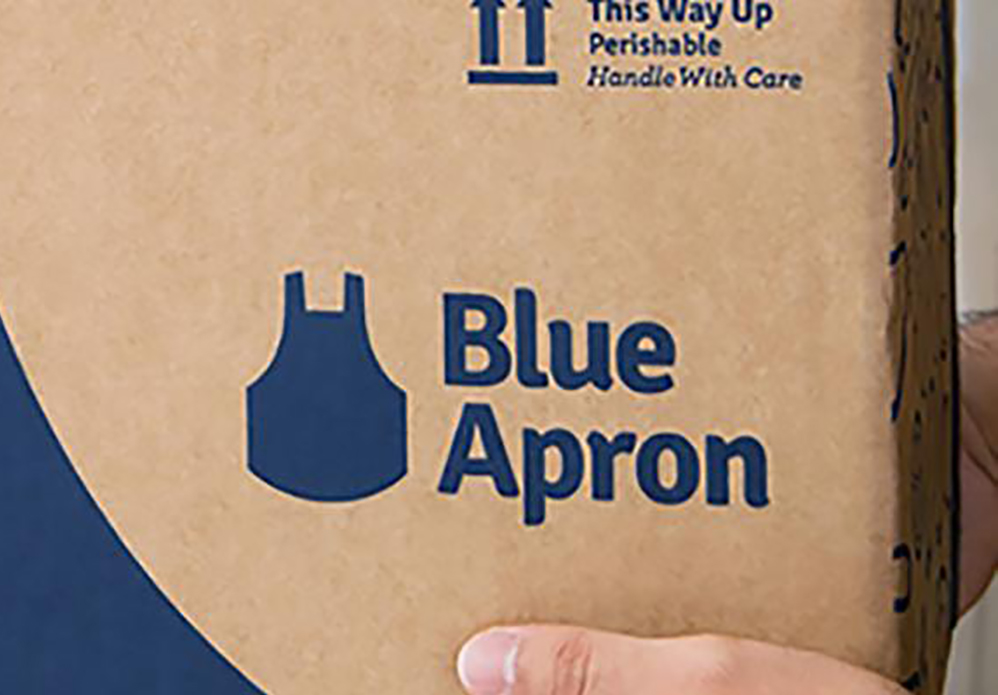The news that Blue Apron President, CEO and co-founder Matt Salzberg has stepped down, with the New York-based company’s board of directors appointing former CFO Brad Dickerson to succeed him, may cause industry watchers to wonder what the change means for the meal-kit service in particular, which has experienced plunging stock prices, a hiring freeze, job cuts, high-profile executive defections, and operational issues at its new Linden, N.J., fulfillment center since its initial public offering in June, or even for the meal-kit sector in general.
“Blue Apron suffers from common issues plaguing many pure-plays in the grocery space,” David Bishop, partner at Barrington, Ill.-based consultancy Brick Meets Click, and a keen observer of the meal-kit business, told Progressive Grocer. “Notable and respected players, like Jet and even Amazon, have had similar challenges earlier, which they addressed either by being acquired by or buying a brick-and-mortar grocer, respectively.”
According to Bishop, “High operating costs driven by marketing and fulfillment are merely symptoms” of Blue Apron’s difficulties. “Not having a physical presence in the markets served and the lack of established and strong consumer connections are the root causes,” he asserted. “Blue Apron is very dependent on high marketing spend levels to drive growth of new customers; however, their value proposition – like many – don’t insulate them from increased competition.”
Asked what issues Dickerson would need to grapple with in his new role, Bishop replied: “The incoming CEO likely needs to consider the feasibility of being acquired by a traditional grocer retailer, like what happened with Plated, taking the company private via a investor group, or issuing a second round of shares in the company publicly. Absent these options, the question becomes, where does it find capital to give it more time to become profitable?”
THREAT FROM SUPERMARKETS
Despite Blue Apron’s well-publicized woes, however, Bishop doesn’t believe the entire meal-kit sector is tottering on the brink, although he does see an advantage for established brick-and-mortar food retailers.
“Blue Apron’s challenges are not an indictment on the meal-kit segment,” he emphasized. “Meal kits continue to grow in popularity. Brick Meets Click found that the monthly active-user rate stood at over 7 percent in mid-2017, up 3.5 percentage points from 2015 levels. The meal-kit segment also enjoys high satisfaction and likelihood-to-repeat rates compared to other online grocery segments, according to the same research, which is due to the fact that it addresses a very specific problem for a key group of consumers.”
However, Bishop noted: “The threat facing Blue Apron and other meal-kit pure-plays is the growing competition related to traditional grocers offering meal kit solutions, too. It’s our opinion that supermarkets are in the best position to win the largest share of meal kits, as they have the advantage of physical presence in the market and established relationships with customers who’ve relied on them for years already for similar types of products.”
Observing that the current situation was reminiscent of “the fable of the tortoise and the hare,” he explained: “Supermarkets are like the tortoise, as some may view them as being too slow to adapt, whereas Blue Apron and other pure-plays are like the hare, as they’re growing as fast as possible without regard to knowing if they can win the race. So, supermarkets should take comfort in know that a slow and steady approach that puts profits over sales is still a winning formula, even though it may not seem so all the time.”
While no longer involved in day-to-day operations, Salzberg will remain with Blue Apron as executive chairman of the board, in which capacity he’ll help guide the company’s long-term strategy, and still maintains a “significant stake” in the business, as Bloomberg reported. Meanwhile, Dickerson, who will focus on improving profitability, has affirmed the company’s previously revealed financial guidance for the second half of 2017, including net revenue in the range of $380 million to $400 million, and continued expectation of an adjusted EBITDA loss of $70 million to $75 million.
Blue Apron has begun a search for a new CFO.
Article By: Progressive Grocer

